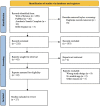User engagement in mobile apps for people with schizophrenia: A scoping review
- PMID: 36703941
- PMCID: PMC9871567
- DOI: 10.3389/fdgth.2022.1023592
User engagement in mobile apps for people with schizophrenia: A scoping review
Abstract
Over the past decade, there has been an increase in the number of mobile apps designed for mental health proposes and mHealth has been perceived as a promising approach to help people with schizophrenia to manage their condition. However, adoption rates are relatively low and long-term user engagement is a major issue. The aim of this study is to identify and better understand what strategies and factors may influence user engagement and facilitate prolonged use of apps for people with schizophrenia to better manage their illness. A scoping review was conducted in accordance with the Arksey and O'Malley scoping review framework and following PRISMA ScR guidelines. The sources consisted of searching four electronic databases. Rayyan software was used for this study selection process and a narrative approach was used to synthesize the extracted data. A total of 28 studies which met the inclusion criteria were identified. The engagement strategies included push notifications, message prompts, personalization, application customization, goal setting, game-like features, use of different multimedia formats, social connectedness, support (peers and professionals), reliability of content and quality of feedback received. Some demographic factors may influence adherence such as age, gender, education level and socioeconomic status. Other factors also may play a role impacting engagement: health status, data privacy and security, involvement in design process, incentives for participation, app usage fitting in the user routines, initial training, and constant technical support. Included studies present high heterogeneity in outcome measures and thresholds criteria to assess engagement. Understanding what influences engagement and how to measure it is essential to enhance the design of mobile apps and deliver scalable solutions to help people with schizophrenia better manage their illness in their real-world uptake.
Keywords: engagement; mHealth; mobile app; schizophrenia; scoping review.
© 2023 Simões de Almeida and Marques.
Conflict of interest statement
The authors declare that the research was conducted in the absence of any commercial or financial relationships that could be construed as a potential conflict of interest.
Figures
Similar articles
-
The Use of Gamification and Incentives in Mobile Health Apps to Improve Medication Adherence: Scoping Review.JMIR Mhealth Uhealth. 2022 Feb 21;10(2):e30671. doi: 10.2196/30671. JMIR Mhealth Uhealth. 2022. PMID: 35188475 Free PMC article.
-
Surveying the Role of Analytics in Evaluating Digital Mental Health Interventions for Transition-Aged Youth: Scoping Review.JMIR Ment Health. 2020 Jun 25;7(6):e15942. doi: 10.2196/15942. JMIR Ment Health. 2020. PMID: 32348261 Free PMC article.
-
Understanding user engagement in mobile health applications from a privacy management perspective.Health Promot Int. 2024 Aug 1;39(4):daae103. doi: 10.1093/heapro/daae103. Health Promot Int. 2024. PMID: 39166487
-
Privacy Assessment in Mobile Health Apps: Scoping Review.JMIR Mhealth Uhealth. 2020 Jul 2;8(7):e18868. doi: 10.2196/18868. JMIR Mhealth Uhealth. 2020. PMID: 32459640 Free PMC article.
-
Evaluation of the Current State of Chatbots for Digital Health: Scoping Review.J Med Internet Res. 2023 Dec 19;25:e47217. doi: 10.2196/47217. J Med Internet Res. 2023. PMID: 38113097 Free PMC article.
Cited by
-
Engagement and attrition in digital mental health: current challenges and potential solutions.NPJ Digit Med. 2025 Jul 2;8(1):398. doi: 10.1038/s41746-025-01778-w. NPJ Digit Med. 2025. PMID: 40604240 Free PMC article.
-
Application of a Sociotechnical Framework to Uncover Factors That Influence Effective User Engagement With Digital Mental Health Tools in Clinical Care Contexts: Scoping Review.J Med Internet Res. 2025 Apr 28;27:e67820. doi: 10.2196/67820. J Med Internet Res. 2025. PMID: 40293798 Free PMC article.
-
How mental health status and attitudes toward mental health shape AI Acceptance in psychosocial care: a cross-sectional analysis.BMC Psychol. 2025 Jun 6;13(1):617. doi: 10.1186/s40359-025-02954-z. BMC Psychol. 2025. PMID: 40481588 Free PMC article.
-
Initial Requirements for the Prototyping of an App for a Psychosocial Rehabilitation Project: An Integrative Review.Int J Environ Res Public Health. 2025 Feb 18;22(2):310. doi: 10.3390/ijerph22020310. Int J Environ Res Public Health. 2025. PMID: 40003535 Free PMC article.
-
The engagement problem: A review of engagement with digital mental health interventions and recommendations for a path forward.Curr Treat Options Psychiatry. 2023 Sep;10(3):119-135. doi: 10.1007/s40501-023-00297-3. Epub 2023 Aug 25. Curr Treat Options Psychiatry. 2023. PMID: 38390026 Free PMC article.
References
-
- Hoffman L, Wisniewski H, Hays R, Henson P, Vaidyam A, Hendel V, et al. Digital opportunities for outcomes in recovery services (DOORS): a pragmatic hands-on group approach toward increasing digital health and smartphone competencies, autonomy, relatedness, and alliance for those with serious mental illness. J Psychiatr Pract. (2020) 26(2):80–8. 10.1097/PRA.0000000000000450 - DOI - PMC - PubMed
-
- Naslund J, Aschbrennerb KA. Technology use and interest in digital apps for mental health promotion and lifestyle intervention among young adults with serious mental illness. J Affect Disord Rep. (2021) 6:100227. 10.1016/j.jadr.2021.100227 - DOI
Publication types
LinkOut - more resources
Full Text Sources
Miscellaneous



